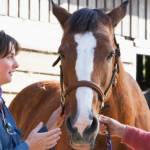Oral Sugar Test for Horses with Insulin Resistance

The intravenous glucose tolerance test (IVGTT) remains a gold standard tool for diagnosis of insulin resistance, a component of equine metabolic syndrome, in horses. Rather than measuring only a single blood sample for insulin and sugar levels, the IVGTT is a dynamic test, requiring several blood samples collected over one or more hours.
“Dynamic tests like the IVGTT are more sensitive for diagnosing insulin resistance in horses. Once definitively diagnosed, affected horses can be fed and managed more appropriately to minimize the chances of developing laminitis,” explains Kathleen Crandell, Ph.D., an equine nutritionist at Kentucky Equine Research.
Although an effective test, the IVGTT is often performed in a clinic setting and requires a catheter and multiple blood samples. To determine whether an oral, rather than intravenous, sugar test could make testing for insulin resistance (and therefore equine metabolic syndrome) easier for horse owners, a research team directly compared the oral sugar test to the IVGTT.
The oral sugar test used by the group of researchers* involved administering corn syrup (0.15 mL/kg of body weight) to fasted horses and collecting the blood samples approximately every 30 minutes for 2 hours. Samples were later analyzed for sugar and insulin levels. The test was conducted in 10 horses meeting the criteria for equine metabolic syndrome and 8 healthy control horses.
“The study authors found that the oral sugar test results were positively correlated to the IVGTT results, suggesting the oral sugar test is a viable, economic, and amenable field test for insulin resistance in horses. Further tests are needed to identify the best timing of blood sampling and establishing reference ranges using larger populations of healthy and resistant horses,” concludes Crandell.
*Schuver, A., N. Frank, K.A. Cheroy, et al. 2014. Assessment of insulin and glucose dynamics by using an oral sugar test in horses. Journal of Equine Veterinary Science 34:465-470.








